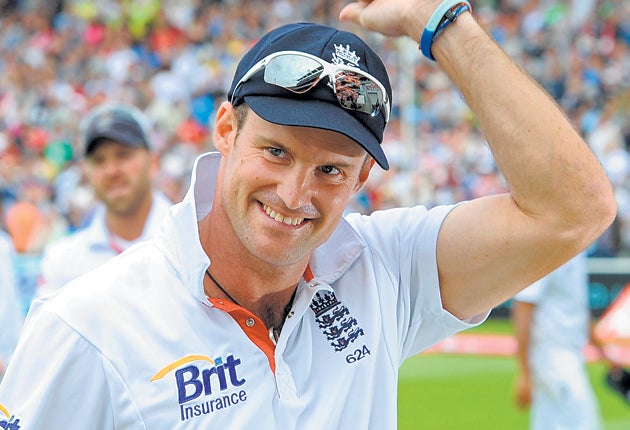Why Strauss has become his team's greatest ever captain
His CV includes Ashes wins home and away and world No 1 spot, but saving flailing side is opener's top feat, writes Stephen Brenkley

There can be no other job like it. Part of life as a professional sportsman is being told how to go about your business by people who claim to be experts but have never been within a light year of a changing room.
This is perfectly normal. The Prime Minister has recently had more advice than he could shake a stick at, if stick-shaking were permissible in the present climate, from thousands of observers who have never held elected office in their lives. It comes with the territory.
For Andrew Strauss it is much worse than that. Every day he goes to work he is scrutinised, dissected and perused by most of his recent predecessors as the captain of the England cricket team, some of whom may know what they are talking about.
Last week at Edgbaston, where England, under Strauss's leadership, became the top-ranked Test team for the first time, six recent captains were on duty as commentators. They spanned the years from 1980 to 2008 and in chronological order were Ian Botham, David Gower, Alec Stewart, Michael Atherton, Nasser Hussain and Michael Vaughan.
Others like Geoff Boycott, Bob Willis, Graham Gooch and Mike Gatting were also around, although the most celebrated of all, Mike Brearley, who normally rolls up on a Saturday on Sunday newspaper duty, was missing as England sealed an innings-and-242-run win to take the series.
Strauss can now be reasonably assessed as the best of the lot of them. Given that he has won Ashes series home and away, has led the side to six successive Test series wins, including this crushing defeat of India, the previous top-ranked side, and has now won 20 of his 38 Tests as captain, the case is sound.
Although his qualities of statesmanship and the obvious fact he is simply a good bloke are universally accepted, appraisals of Strauss's tactical acumen by his peers, however, tend to be lukewarm.
Perhaps because he is not an attacking captain by nature, perhaps because he does not set tricksy fields, perhaps because he is not an instinctive changer of bowling, it is easy to overlook his virtues. Strauss is endlessly patient as a captain in that he allows strategies to unfold to their logical conclusion.
England have been meticulous in their planning lately – which is not to say they did not go into great detail before – and Strauss senses the reason for that. A plan that does not work within an over is not necessarily a bad plan.
What Strauss may have managed above all is what all captains must try to do and, human nature being what it is, almost all fail to do. In his seminal work, The Art of Captaincy, Brearley wrote: "No captain can bring out the best in all players in the team. Temperamentally we all respond better to some than others. There are those who impose on us pressures that make us particularly touchy, or which arouse our anxieties unduly.
"But a good captain can respond to a player in enough cases for there to be significant overall improvement. The team as a whole and its atmosphere can be affected for good or ill."
Part of Brearley's reputation rests on his ability to get the absolute best out of Botham (not least 30 years ago this year) but Strauss seems to have defied Brearley's rationale. He is getting the best out of all of them.
Andy Flower, with whom Strauss has forged an important partnership as coach and captain, rarely omits to mention Strauss's qualities. Gradually and together they have got the men they wanted.
Talking about the evolution of the side, Flower said: "What is right about this side is it's got an outstanding leader in Strauss. He really is a special man. And the players, after being asked to embrace responsibility, have delivered. Strauss asked that of them when he took over the captaincy a couple of years ago and they are repaying him."
The circumstances in which Strauss took over in early 2009 should never be forgotten. Almost his first act as captain was to visit a conflict resolution specialist. The team were in disarray following the breakdown of the relationship between the coach, Peter Moores, and the captain, Kevin Pietersen, which cost them both their jobs.
It is a measure of Strauss the man that when asked to be captain, and disappointed as he was to have been previously overlooked, he immediately suggested that a generation be skipped and that someone like Alastair Cook be appointed. The selectors were not taking no for answer.
That conflict expert was worth the visit as it happens. It was he who suggested assembling a code of values for the team, a charter if you like. From this emerged the request to take individual responsibility for the good of the team which has become the cornerstone of Strauss's captaincy.
Strauss made it clear on Saturday there was to be no resting on laurels, that there were other goals and that only the collective was important.
He has taken English cricket to a great place. The time has not yet come but it will be fascinating to see what Strauss, now 34, does next.
He could write a book on the art of captaincy and conflict resolution.
Subscribe to Independent Premium to bookmark this article
Want to bookmark your favourite articles and stories to read or reference later? Start your Independent Premium subscription today.

Join our commenting forum
Join thought-provoking conversations, follow other Independent readers and see their replies